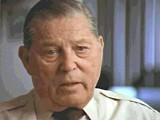You searched for: jewish prisoners
<< Previous | Displaying results 351-375 of 455 for "jewish prisoners" | Next >>
-
Raoul Wallenberg and the Rescue of Jews in Budapest
ArticleSwedish diplomat Raoul Wallenberg led an extensive rescue effort during the Nazi era. His work with the War Refugee Board saved thousands of Hungarian Jews.
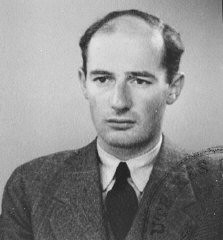
-
International Holocaust Remembrance Day
ArticleJanuary 27, anniversary of the liberation of Auschwitz, is designated by the United Nations General Assembly as International Holocaust Remembrance Day (IHRD).
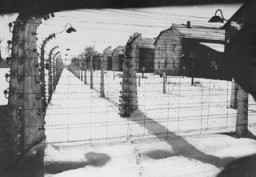
-
SS personnel at the Sobibor killing center relax on a terrace
PhotoRare photograph showing Sobibor killing center personnel relaxing and posing, all while implementing the mass murder of at least 167,000 innocent Jews.
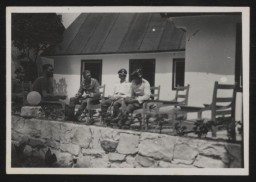
-
View of the Sobibor killing center
PhotoRare image of the Sobibor killing center, taken from an album of photos belonging to Sobibor deputy camp commandant Johann Niemann.
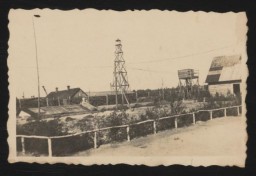
-
Occupation of Kyiv
Timeline EventSeptember 19, 1941. On this date, German forces entered Kyiv in Soviet Ukraine.
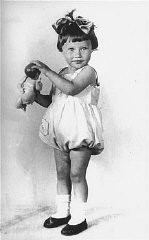
-
Irena Sendler describes how she was arrested and tortured by the Gestapo
Oral HistoryIrena Sendler (1910–2008) was a member of the Council for Aid to Jews, codenamed “Żegota.” Żegota was a clandestine rescue organization of Poles and Jews in German-occupied Poland. Supported by the Polish government-in-exile, Żegota coordinated efforts to save Jews from Nazi persecution and murder. It operated from 1942 to 1945. Irena Sendler (Sendlerowa) was working as a social worker in Warsaw when World War II broke out in 1939. After the Nazis forced Warsaw’s Jews to move into the ghetto…
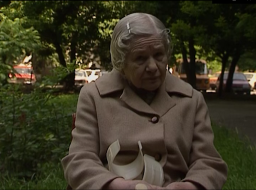
-
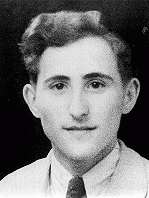
-
Elzbieta Lusthaus
ID CardElzbieta grew up in Iwonicz, a resort town in southwestern Poland noted for its mineral water. Her father, Edmund, was a respected physician and Helena, her mother, had studied pharmacology. At home, they spoke Polish and were among the few Jewish families who lived in Iwonicz. 1933–39: When German troops invaded Poland on September 1, 1939, Elzbieta's father was drafted into the Polish army. Seventeen days later, the Soviet army drove in from the east and Edmund was captured. He was transported to a…
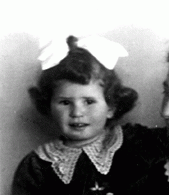
-
Jakob Frenkiel
ID CardJakob was one of seven boys in a religious Jewish family. They lived in a town 50 miles west of Warsaw called Gabin, where Jakob's father worked as a cap maker. Gabin had one of Poland's oldest synagogues, built of wood in 1710. Like most of Gabin's Jews, Jakob's family lived close to the synagogue. The family of nine occupied a one-room apartment on the top floor of a three-story building. 1933-39: On September 1, 1939, just a few months before Jakob turned 10, the Germans started a war with Poland.…
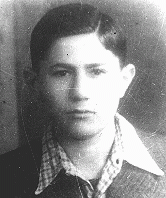
-
Ernest Domby
ID CardErnest's father was a professional musician who toured with a Roma ("Gypsy") band and was often away for several months at a time. At home in Teplice-Sanov, a town in the Sudetenland near the Czech-German border, Ernest's mother took care of Ernest and Elizabeth, his younger sister, and the children's invalid grandmother. Ernest's uncles, Rudolf and Viktor, helped the family. 1933-39: In Teplice-Sanov Ernest was expelled from secondary school for being Jewish—his Uncle Viktor then helped to get him into…
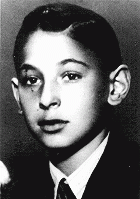
-
Walter Schnell
ID CardWalter was born to a Jewish family in the German town of Strehlen, 25 miles south of Breslau. His family's crystal business was prominent in the town for more than 100 years. Walter's parents sent him to Berlin in the mid-1920s to learn the porcelain trade. He returned to Strehlen in 1926 to help his family run the business. 1933-39: In 1937 Walter's family moved to Breslau. After the German pogroms of 1938 [Kristallnacht, Night of Broken Glass], he was deported to Buchenwald. When he arrived he was…
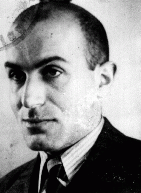
-
Miso Vogel
ID CardMiso came from a religious family in a small village in Slovakia, where his father was a cattle dealer. He was the eldest of five children. When Miso was 6 his family moved to Topol'cany, where the children could attend a Jewish school. Antisemitism was prevalent in Topol'cany. When Miso played soccer, it was always the Catholics versus the Jews. 1933-39: In 1936 Miso had his bar mitzvah and was considered a man. His grandparents traveled 50 miles for it; he was so happy they were all together. In March…
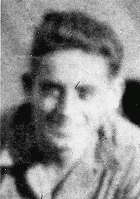
-
Zdenka Popper
ID CardZdenka was one of four children born to a Jewish family in Kolinec, a southwestern Bohemian town near the German border. Her father was a farmer and a lumber and grain merchant. Situated in the foothills of the Bohemian Forest, Kolinec was surrounded by rolling hills. Zdenka attended business school in the nearby town of Klatovy and, in 1927, moved to Prague with her uncle. 1933-39: Zdenka remembers how worried her mother was about the rise of German antisemitism in 1932. After listening to a radio…
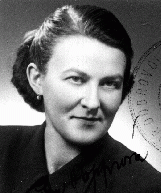
-
Ruth (Huppert) Elias
ID CardRuth grew up in Moravska Ostrava, a city in the region of Moravia with the third-largest Jewish community in Czechoslovakia. When Ruth was a child her parents divorced. She and her sister, Edith, moved in with their paternal grandmother and then with their uncle, but they kept in close contact with their father. Ruth trained to be a pianist and hoped to attend a musical academy in Prague. 1933-39: In March 1939 Bohemia and Moravia were occupied by the Germans and declared a German protectorate. That fall,…
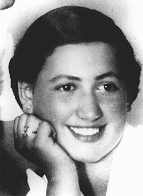
-
Arthur Menke
ID CardArthur was born to a Jewish family in Germany's largest port city, Hamburg. His father owned a small factory that manufactured rubber stamps. In the early 1930s, Hamburg was home to the fourth largest Jewish community in Germany, which had numerous social and cultural institutions. 1933-39: By 1935 conditions for Hamburg's Jews were bad. Arthur's family was moved to another part of town and in 1938, the Nazis seized his father's business. On national holidays many German citizens unfurled red, white and…
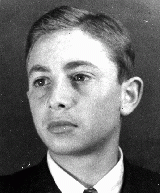
-
Frimit Bursztyn
ID CardFrimit was one of eight children born to Yiddish-speaking, religious Jewish parents. The Bursztyns lived in the heart of the same Jewish neighborhood in Warsaw where Frimit's father owned and operated a bakery located on Zamenhofa Street. In 1920 the Bursztyns moved to a comfortable, two-bedroom apartment in the same neighborhood at 47 Mila Street. Frimit attended Warsaw public schools. 1933-39: By 1939 six of Frimit's brothers and sisters had already moved out. Only Frimit and her younger brother were…
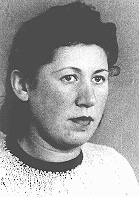
-
Kalman Goldberg
ID CardKalman was one of seven children born to religious Jewish parents in the town of Tarnow. He attended public school in the morning and religious school in the afternoon. Kalman's father owned a factory that manufactured kosher soap, sabbath candles and candles for church altars. The Goldbergs lived above their factory, which was located in a predominantly Jewish neighborhood. 1933-39: The Germans occupied Tarnow on September 8, 1939. The next day, they burned the synagogues. One synagogue, built of stone…
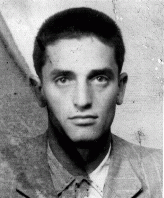
-
Wilhelm Edelstein
ID CardWilhelm was the oldest of two children in a Jewish family living in the Habsburg capital of Vienna. Shortly after Wilhelm was born, World War I broke out. Because of food shortages, Wilhelm and his mother left for her hometown of Hostoun, near Prague. After the war they returned to Vienna where his father had remained to run his shoe business. As a young man, Wilhelm worked for his father. 1933-39: In March 1938 Germany annexed Austria. Soon after, the Germans arrested Wilhelm because he was a Jew dating…
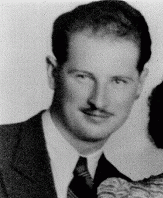
-
Otto-Karl Gruenbaum
ID CardBorn to a Jewish father and a Catholic mother, Otto grew up in a city well known for its musical tradition. The younger of two children, Otto began studying the piano at age 10. After entering the Vienna Conservatory of Music, he gave his first concert at age 14. Encouraged by Maestro Bruno Walter, he hoped to become a conductor and concert pianist. 1933-39: After Germany annexed Austria in March 1938, Otto was kicked out of the Vienna Conservatory. One night, two men ordered him to go with them to a…
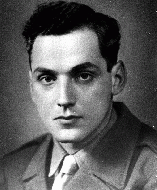
-
Ruth Singer
ID CardRuth was the only child of a Jewish family in the German town of Gleiwitz, near the Polish border. She attended public school until the fourth grade, when she transferred to a private Catholic school. Twice a week Ruth attended religious school in the afternoons. One of her favorite pastimes was playing table tennis. 1933-39: Ruth's father was born in Poland and the Nazi government considered him a Polish citizen. In October 1938 the Nazis expelled Polish Jews from Germany, allowing each deportee to leave…
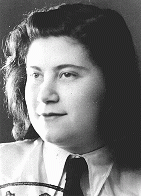
-
Irmgard Rosenberg
ID CardIrmgard was one of three children born to a Jewish family in the famous university city of Goettingen. The city had a small Jewish population, and only one synagogue. Irmgard's father, with his two brothers, owned a linen factory that had been founded by Irmgard's grandfather. Irmgard attended public school in the city. 1933-39: With the onset of the Depression in the 1930s, the family's factory went into decline. When the Nazis came to power in 1933, they confiscated the Rosenbergs' factory. Later, the…
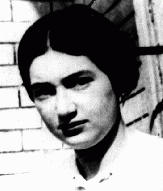
-
Morris Kornberg
ID CardMorris was the youngest of six children born to a religious Jewish family in Przedborz, a south central Polish town with a large Jewish population. Morris' family owned a business that supplied nearby factories with raw metal materials. 1933-39: When Germany invaded Poland in early September 1939 Morris and his family fled to the woods. They returned a few days later; most of the town had been burned down. The Nazis set up a ghetto and ordered everyone age 13 to 50 to report for work details. His family…
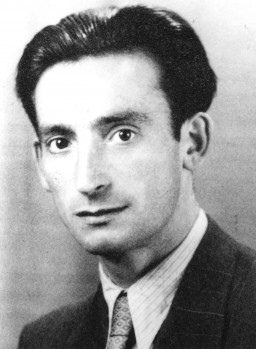
-
Pawel Wos
ID CardPawel, a Roman Catholic, fled to Danzig, Germany, in 1914 to avoid conscription in the Russian army. Since Germany and Russia were at war, Pawel was arrested by the Germans as an enemy alien and sent to work on a farm in northern Germany. He met Anna Szachowska there, and they married in 1918. The couple moved to Warsaw where they raised 4 children. In 1930 Pawel opened a textile business. 1933-39: Despite the Depression, Pawel's business prospered and they expanded their operations. In 1938 some friends…
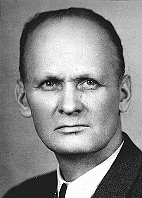
-
Edward Adler describes deportation to and arrival at the Sachsenhausen camp
Oral HistoryEdward was born to a Jewish family in Hamburg. In 1935, the Nuremberg Laws prohibited marriage or sexual relations between German non-Jews and Jews. Edward was then in his mid-twenties. Edward was arrested for dating a non-Jewish woman. Classified as a habitual offender, he was later deported to the Sachsenhausen concentration camp, near Berlin. He was forced to perform hard labor in construction projects. Edward had married shortly before his imprisonment, and his wife made arrangements for their…
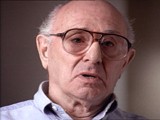
-
Leopold Page describes meeting German industrialist Oskar Schindler
Oral HistoryLeopold was a teacher in Krakow, Poland, when World War II began in 1939. While serving in the Polish army, he was captured by Germans. Leopold escaped from a prisoner-of-war transport. Soon after, he met the German industrialist Oskar Schindler. The two became friends. Leopold was forced to live in the Krakow ghetto. He later worked in Schindler's factory in Bruennlitz. He and the other Jews who worked there were treated relatively well and protected from the Nazis. After the war, Leopold moved to the…
